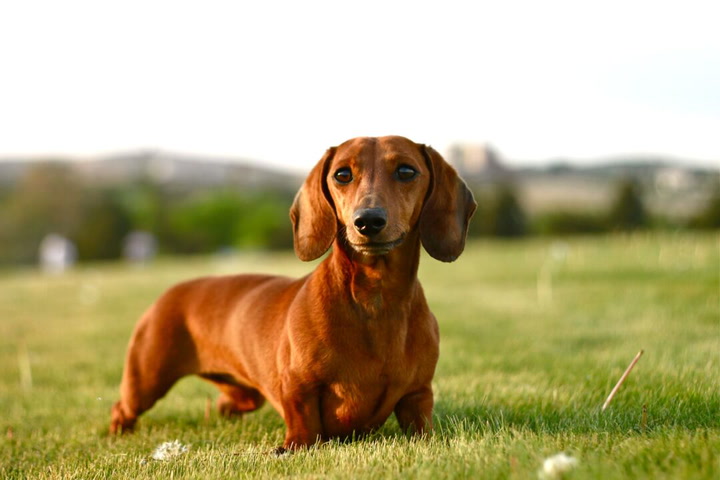The Dachshund family, often affectionately referred to as “wiener dogs,” stands out as one of the most distinctive and endearing dog breeds in the pet world. But have you ever wondered, “what breed is a wiener dog?” This question is indeed intriguing and worth exploring to understand the origins and characteristics of this beloved canine breed.
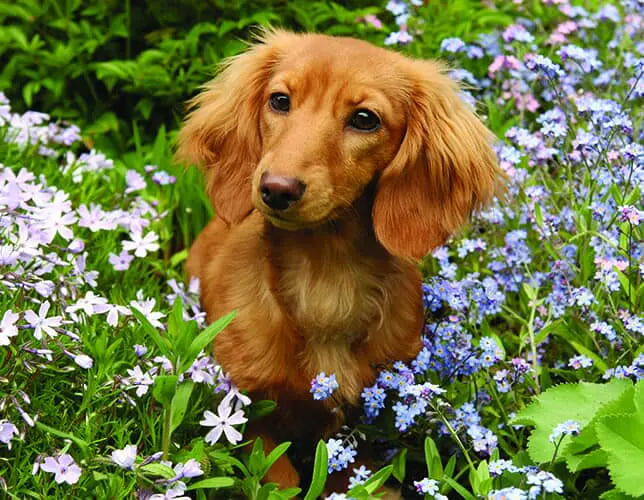
What breed is a wiener dog?
Wiener dogs are officially known as Dachshunds, a breed that originated in Germany. The name “Dachshund” literally translates to “badger dog” in German, reflecting their original purpose as hunting dogs specialized in pursuing badgers and other burrowing animals.

Physical characteristics
Dachshunds are immediately recognizable due to their distinctive body shape. Let’s explore their key physical traits:
Size
Dachshunds are generally small to medium-sized dogs, with their unique proportions setting them apart from other breeds.
Short legs and elongated body
The most striking feature of Dachshunds is their long, low-slung body paired with short, stubby legs. This unique body structure was developed to allow them to efficiently enter and navigate through burrows.
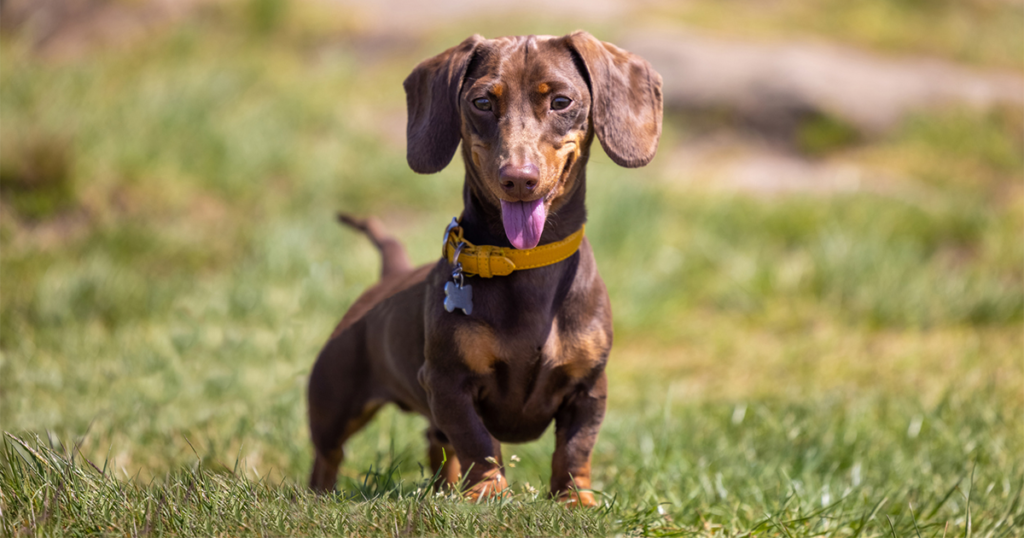
Different types of fur
Dachshunds come in three coat varieties:
- Smooth: Short, sleek coat
- Long: Silky, feathered coat
- Wire: Coarse, wiry coat with a beard and eyebrows
Size variations
Dachshunds are bred in two size variations:
| Size | Weight Range |
|---|---|
| Standard | 16-32 pounds |
| Miniature | Under 11 pounds |
Dachshund temperament and personality
General personality traits
Dachshunds are known for their:
- Curiosity
- Stubbornness
- Playfulness
- Loyalty
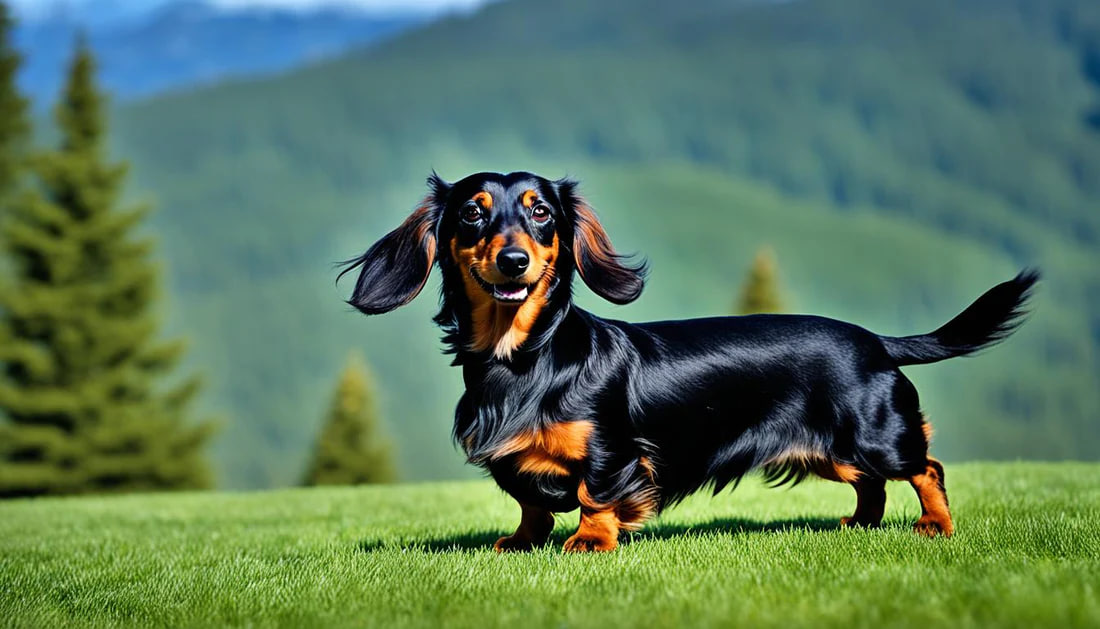
General personality traits
Intelligence and trainability
While intelligent, Dachshunds can be challenging to train due to their independent nature. Positive reinforcement and consistency are key to successful training.
Need for socialization
Early socialization is crucial for Dachshunds to develop into well-rounded adults. Exposure to various people, animals, and environments helps prevent fear and aggression issues.
Interaction with children and other pets
Dachshunds can be good family dogs but require supervision with young children due to their sensitive backs. They may be territorial with other dogs, so proper introductions are important.
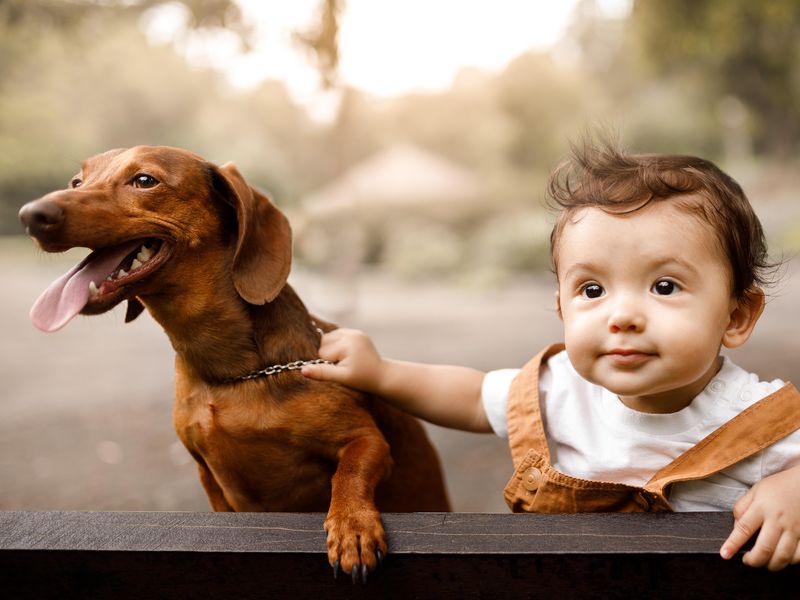
Specific nutritional needs of Dachshunds
Dachshunds are a small breed characterized by their long body shape, often prone to spine issues due to genetic factors. Therefore, appropriate nutrition is crucial to maintaining their health and development. Here are specific nutritional factors for Dachshunds:
- Feeding Regimen: Choose high-quality, nutritionally balanced food suitable for their age. It’s beneficial to divide their meals into multiple small portions throughout the day to minimize the risk of gastric torsion.
- Fat and Calories: Ensure adequate levels of fat and calories to maintain a healthy body condition, while controlling intake to avoid excessive weight gain.
- Protein: Provide sufficient protein to support muscle development and overall health.
- Fiber: Helps maintain a healthy digestive system and prevents constipation, a common issue in Dachshunds.
- Calcium and Vitamin D: Essential for bone and joint development, but should be carefully balanced to avoid issues related to spine health.
- Weight Monitoring: Due to their predisposition to obesity, monitoring weight and adjusting food intake accordingly is crucial.
- Hydration: Always provide clean water throughout the day to maintain urinary tract health and support kidney function.
- Age-Appropriate Diet: Choose food appropriate for each stage of your Dachshund’s life, from puppy to adult and senior.
Additionally, consult with a veterinarian to ensure the nutrition plan you choose meets the specific health and dietary needs of your Dachshund.

Dachshund Health
Common health issues in Dachshunds
Dachshunds are prone to certain health problems, including:
- Intervertebral Disc Disease (IVDD)
- Patellar luxation
- Eye problems (e.g., progressive retinal atrophy)
- Obesity
Preventative measures and routine health care
To maintain optimal health in Dachshunds:
- Regular veterinary check-ups
- Maintain a healthy weight
- Avoid activities that stress the back
- Dental care
- Exercise appropriate to their abilities

Preventative measures and routine health care
Dachshunds as family pets
Suitability for different life situations
Dachshunds can adapt to various living situations, making them suitable for singles, couples, and families alike.
Adapting to apartment living
Their small size makes Dachshunds well-suited for apartment living, provided they receive adequate exercise and mental stimulation.
Energy levels and space requirements
Despite their small size, Dachshunds have moderate energy levels and require regular exercise to maintain physical and mental health.
Longevity and long-term commitment
Dachshunds typically live 12-16 years, representing a significant long-term commitment for potential owners.

Fun facts and popular culture
Famous Dachshunds in history and media
Dachshunds have been beloved pets of many notable figures, including:
- Pablo Picasso
- Andy Warhol
- Queen Victoria
Dachshund-specific events and clubs
- Annual Dachshund races
- Wiener Dog Nationals
- Various Dachshund enthusiast clubs worldwide
Interesting trivia about this dog breed
- Dachshunds were one of the first breeds used for dog shows in the 19th century
- They were temporarily renamed “liberty pups” in the US during World War I due to anti-German sentiment
- A Dachshund named Waldi was the first official Olympic mascot (Munich 1972)
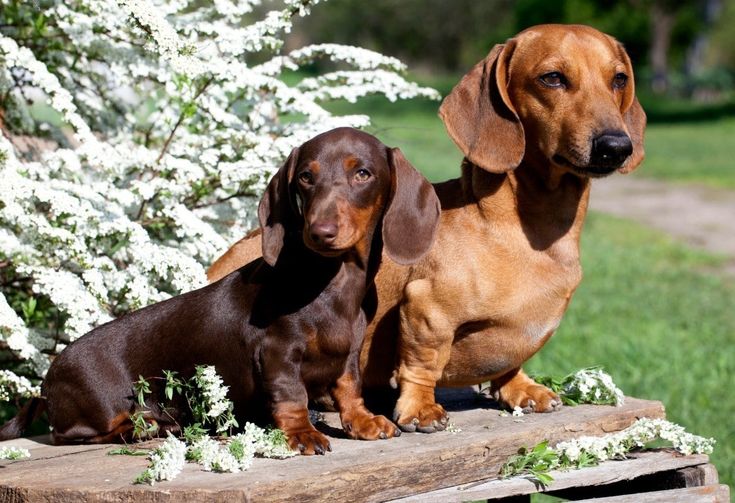
Interesting trivia about this dog breed
FAQs
Q : What fruit can dachshunds eat?
A : Dachshunds can safely enjoy a variety of fruits in moderation. When considering what fruit can dachshunds eat , it’s essential to introduce them gradually and in small quantities to monitor for any adverse reactions.
Q : When do wiener stop growing?
A : Understanding when do dachshunds stop growing is crucial for pet owners to anticipate their dog’s development stages and needs.
Dachshunds typically stop growing in height by the time they reach around 12 months of age. However, their bodies continue to mature and fill out until they are about 18 months old, reaching their full adult size and weight during this period.
Q : Are wiener dogs good pets for families?
A : Yes, Dachshunds can make excellent pets for families. They are affectionate, brave, and generally good with children when properly socialized and trained.
Q : Do wiener dogs have any health concerns?
A : Dachshunds are prone to certain health issues, including back problems due to their elongated spines. It’s important to handle them carefully and provide proper support to prevent spinal injuries.
Read more Best dog food for dachshunds
Conclusion
In conclusion, uncovering the answer to “ what breed is a wiener dog” provides a deeper understanding of the Dachshund’s rich history and unique characteristics. Whether you’re drawn to their iconic appearance, steadfast loyalty, or remarkable hunting abilities, this breed continues to captivate dog enthusiasts worldwide. Whether you’re contemplating adopting a Dachshund or simply intrigued by their lineage, exploring the origins of “what breed is a wiener dog” offers insight into their enduring appeal and significant role in canine history.

Cuddle Companions is your go-to resource for everything you need to keep your furry friends happy and healthy. We specialize in providing detailed and helpful information about the best foods, treats, and care practices for pets of all kinds. Whether you’re a seasoned pet owner or a new puppy parent, our team of experienced and passionate experts is dedicated to offering reliable advice and recommendations. At Cuddle Companions, we believe that a well-cared-for pet is a happy pet, and we’re here to help you every step of the way. Visit us at [bestdogfoodfordachshunds.net] for more information and resources.

